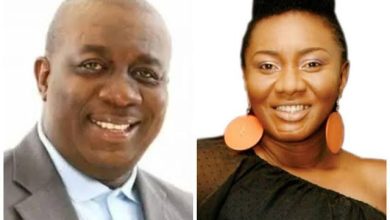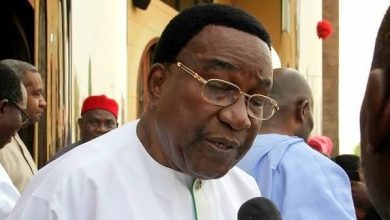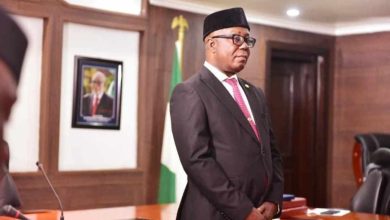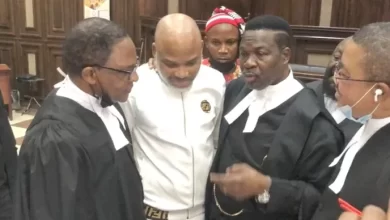APC’s convention outcome amplifies lack of ideologies in Nigeria, say Lawyers
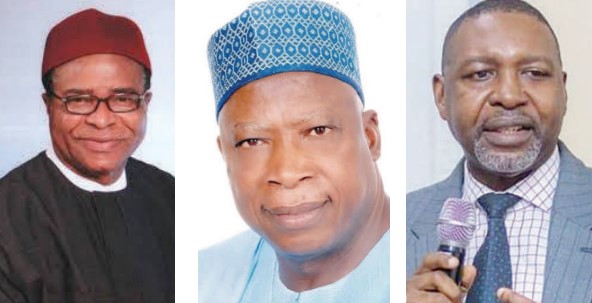
By Onyebuchi Sampson
Last Sunday’s convention of the All Progressive Congress (APC) may have come and gone, but the ripples generated by the emergence of former People Democratic Party (PDP) members as leaders of the ruling political grouping may continued to linger.
While many bigwigs in the ruling APC are worried about the domination of all the party’s key national positions by politicians, who had defected from the PDP, opposition party members and rights activists have taunted the APC for choosing leaders, who they claimed ruined the country in the past years.
For instance , a former governor of Nasarawa State, Abdullahi Adamu, who alongside some others clinched key positions in the party’s new National Working Committee, decamped from the PDP to the APC.
Adamu served as governor of Nasarawa State for eight years between 1999 and 2007 as a candidate of the Peoples Democratic Party.
Also, Adamu was the first Chairman of the Nigeria Governors’ Forum (NGF), and after his tenure got elected to the Senate to represent Nasarawa West still on PDP’s ticket.
However, in January 2014, Adamu decamped to the APC despite being a founding member of the PDP in 1998.
Also, former Deputy Governor of Osun State, Senator Iyiola Omisore decamped to the APC in February 2021.
Omisore became the deputy governor on the platform of the Alliance for Democracy (AD) between 1999 and 2003.
He later defected to the PDP where he served as a senator between 2003 and 2011.
He joined the Social Democratic Party (SDP) under which he contested the 2018 Osun governorship election on the platform, from where he crossed to the APC.
Similarly, other members of the newly constituted NWC who were former members of the PDP, includes Barr Festus Fuanter (Plateau State), who was appointed as the deputy national secretary.
The new vice-chairman (North Central) of the APC, Muazu Bawa Rjau had also decamped from the PDP to the ruling party.
Others are Mustapha Salihu, national vice-chairman (North -East); Barr Ahmed El-Marzuk, national legal adviser; Uguru Matthew Ofoka, national treasurer; Senator Abubakar Maikafi, national auditor; Betta Edu, national women leader; Barr F.N. Nwosu, national welfare secretary, and Nze Chidi Duru, deputy national organizing secretary.
Victor Giadom emerged as the National Vice Chairman, South-South. Before following the Minister of Transportation to the APC, Giadom served as Commissioner for Works under Governor Amaechi in Rivers State between 2011 and 2015.
Although, President Mohammadu Buhari seemed to have offered explanations on the ruling party’s choice for the former PDP members, however, legal minds were more concerned about its effect on the nation’ s constitutional democracy, describing the development as an affirmation of lack of ideologies among political parties in Nigeria.
Read Also: NBTE director Killed In Abuja-Kaduna terrorist train attack
Baring his mind on the issue, a legal luminary and Senior Advocate of Nigeria (SAN), Chief Mike Ahamba, who, in the past, represented President Muhammadu Buhari as an opposition candidate at the election’s tribunals, noted that the emergence of former PDP members as APC leaders showed that there are no political parties in Nigeria, but political platforms.
Ahamba, who described the emergence of former PDP members as recognitions of their superiority to other members of the ruling party, said it has also proved that political parties only serve as a vehicle for contesting elections in the country, The Trumpet gathered.
He noted that in his soon to be launched book, he had argued that there are no political parties in Nigeria, but election platforms.
According to him, this was also contained in the letter delivered to the conference called by the House of Representatives in the 2000.
He said : “In Nigeria, we have no commitment to the party in which we belonged. We only use it for elections, if it does not favour us on that line, we move to another political party, that is not what a political party should be.
“A political party is supposed to represent someone’s frame of mind and thinking, but nobody is manifesting that for anybody to follow, because individuals have refused to form political parties, but create election platforms.”
Asked if the judiciary could remedy the situation through their decisions and not be merely interpreting laws, Ahamba said the courts are only allowed to expound not expand or create a law whatever it is written in the law
He said: “The judiciary has to interpret the law as it is and then the legislature will look at the interpretation and know whether what was there was right or wrong and amend it.
“I am aware that a judge recently ruled that the Attorney General should go and amend the constitution; that is unfortunate.
“It is a pity that a trained lawyer will write that in a judgment. The job of the court is to interpret the law as it ought to be. That is our own jurisprudence here. “
Asked the place of judicial activism as exemplified by the likes of Justices Kayode Eso, Anthony Aniagolu, Andrews Obaseki, and the rest in this scenario, the legal luminary said judicial activism should not go against the law.
Ahamba said: “I am doing another book on the judiciary and election petitions. You will find out that all the people mentioned in their activism restricted themselves to the law, that even when they wrote minority judgments, they agreed with the law applied by the majority, but say this is my own interpretation of it.
“I am not aware that Eso and others ever went contrary to the law, rather they strictly applied the law in their own ways. They did not change the law, they have no competence to change the law and they recognised that.
“That is why I respect all of them. So, the next book I am writing now is based on some of these things , ‘Judicial attitude and activism, where it hurts and where it is favourable to the polity.’
“While I agree that the judiciary should save our system, because the lawmakers seem not to be doing their jobs, they can only do it within the law.
“ If they keep to the law, which is the purpose of the book I am writing now, they want to change the society.
“Unfortunately some of them refused to apply the law when they ought to apply it.
“I am saying this, because I know my status in the legal profession and when that book is out later in the year, then anybody who is against what I said, will see how I cited some examples. where what I said, happened and why it happened.
“Why would a judge rewrite a rule of court in order to give a particular judgment, is that activism?
“That is fraud. Let us not mix judicial activism with judicial fraud. You don’t change the law in the court, you make recommendations.
“I give you an example. In one of Lord Denning’s books, he mentioned a law that was made which people didn’t like. The issue of the law came before the court , a person was charged under it, after condemning the law, he still convicted the person, who was charged under that bad law. But instead of giving him the appropriate punishment, he said, I now have a discretion to punish and fined him one Penny. He didn’t say this law is bad, I will not apply it, which is what some of us do here. We should applied it, but where there is a discretion to be applied to the issue, we apply it.
“You don’t change the law because you don’t like it in the law courts. No, there are no such competencies.
” The duties are shared by the constitution, the duty of the executive is not to make the law the duty of the court is not to make the law, it is the duty of the National Assembly to make the law, but that duty includes nullifying a law that doesn’t comply with the constitution that is the much they can do.
“So if a law is bad, the judiciary cannot nullify it. You condemn it, but apply it, then it will be taken to the legislature to change following that judgment. This is what it ought to be, people should stick to their own responsibilities. Like somebody making an order that the Attorney General should go and change the law, it is funny. I don’t believe in it but I know that it is against the law.
“I have not seen anywhere in the constitution, where the duty of Attorney General includes amending the law. Section 174 of the Constitution, stipulates the duties of the Attorney General and it does not include amending the law, he can only amend charges in a court.”
Supportively, a legal practitioner and former president of the Committee for the Defence of Human Rights (CDHR),
Malachy Ugwummadu, said the judiciary should intervene without over judicialisation of the process.
Ugwummadu, a notable civil rights Lawyer and social commentator on national issues, noted that the recent court judgments on Umahi and the Cross River State House of Assembly are cases of such interventions expected from the judiciary.
He argued that the judiciary should rescue the nation’s constitutional democracy from the whims and caprices of political jobbers, who lacked ideologies.
On the place of affirmative and consensus in our constitutional democracy,vas displayed during the APC convention in Abuja, he said it was within the confine of the party’s guideline.
According to him, section 84.12 of the guideline said that if the party is going to resort to a consensus as a means of electing leadership, all contestants, who have expressed interests in that particular position should write and sign a letter and sent to the party through the secretariat, indicating that they have accepted the choice of the party and agreed to the elected persons.
“I believe that consensus means an agreement to which there is no dissent. So, if other members of the APC did not protest or file a dissent against, it, then it is consensus.
“If they were pressurised and they succumb to the pressure, the subsequent events, apart from being under duress, is their action, and they can only talk about duress in a court of law not in that hall.
“So, if they have accepted it ,then it is a consensus and let us move on, ” he added.

